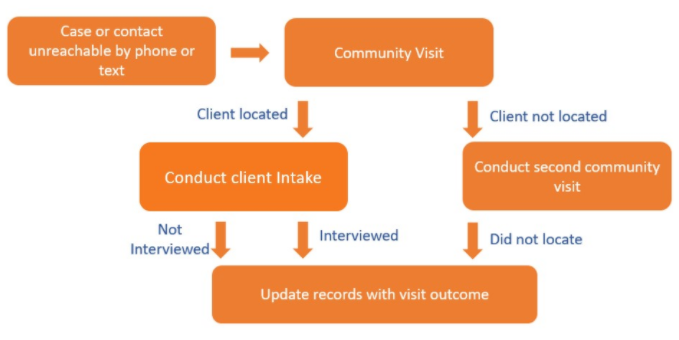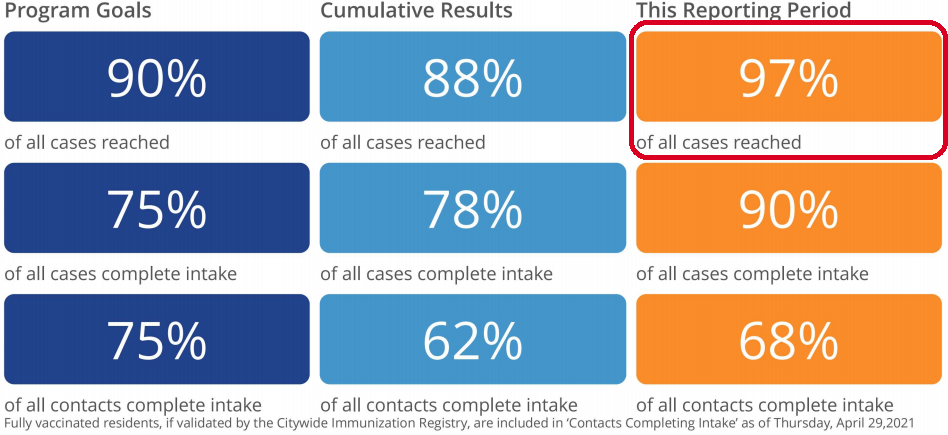When someone tests positive for COVID-19, their life can change quite suddenly. They are concerned not only for their own health, but about spreading the virus to someone else—or if they may have already done so.
The NYC Test & Trace Corps has about 4,000 contact tracers, most of whom work remotely. These specially trained individuals are often the first people a client who tests positive might speak with. As tracers, they work with clients to identify anyone they have been in close contact with, recommend isolation or quarantine in the way that works best for the clients, and connect them with resources to help them do so. Tracers help clients understand the importance of safety both for themselves and for others by informing them about common symptoms of COVID-19, letting them know that speaking with contacts is important to stop the spread, and to alert a provider if their condition worsens.
Tracers call clients every day for the duration of their isolation or quarantine period to help monitor their symptoms and to see if there have been any changes. They may also monitor clients via text message, if that is what the client prefers.
Tracers can also direct clients to a host of additional services like food delivery or a Take Care Hotel, where they can stay free of charge if they are concerned about not being able to stay separate from those they live with. During this vital period, tracers are often the people a client feels comfortable talking to about their situation.
All of these services are offered by tracers over the phone. However, when a client is unable to be reached by phone or a phone number is missing from the client record, the case is forwarded to the Enhanced Investigations team, which deploys a group of specialized tracers whose job is connect with these clients.
Community Engagement Team
These tracers, called community engagement specialists (CES), are trained to do in-person work with hard-to-reach clients.
CES are activated when clients:
- Cannot be reached for intake interviews
- Have started an intake interview but never completed it
- Miss their daily monitoring
Community engagement specialists undergo a series of trainings to ensure that they engage in equitable practices towards clients, respond with a trauma-informed background, are culturally aware, and are able to handle potentially difficult in-person interactions. This approach builds rapport between tracers and their clients.
The Community Engagement Team is one of the nimblest in the Test & Trace Corps, and some may be assigned to special projects that require in-person interaction such as canvassing in neighborhoods with a high infection rate.
Community Engagement Specialists: General Workflow
Retrieved from Public Dashboard: https://www.nychealthandhospitals.org/test-and-trace/

When a CES is given a new case, they will first call or text the client one last time. If the client remains unreachable, the CES will attempt to visit them at their residence. If a client is successfully located, the CES will conduct an intake. If a client does not answer the door on the first visit, a CES will return a second time. If a client is not reached during a second attempt, the CES will leave a letter behind if the address is confirmed by someone else in the household or if there is other proof that the client resides there.
The Trace Community Engagement team consists of over 500 specialists across the five boroughs who speak over 42 languages, including American Sign Language. If a CES engages with a client with whom there is no common language, they have access to the city’s Language Line, which is a service providing interpretation by phone that is available to all tracers, whether they are talking to a client in person or by phone.
Safety
Engaging clients within the community involves dedication as well as proper safety precautions.

CES wear N95 respirator fit-testing equipment as they wait in line to be fitted for N95 masks.
All CES undergo training in how to use personal protective equipment (PPE), have access to N95 masks, have been offered the COVID-19 vaccine, and are advised to conduct daily self-monitoring for COVID symptoms. They also have access to free COVID-19 testing at NYC Health + Hospitals locations.
symptoms. They also have access to free COVID-19 testing at NYC Health + Hospitals locations.
In addition, NYC Health + Hospitals’ security team provides periodic refresher trainings to advise staff on how to be alert and remain safe during the change of seasons. NYC Test & Trace Corps emphasizes not only the physical but the emotional well-being of its tracers, and offers access to a variety of mental health resources.
Impact
It is likely that without CES going into communities and knocking on doors, clients for whom there is no correct contact information would never be reached. CES have often found that clients are more receptive and therefore more likely to agree to complete their intake when they see a face on the other side of the door and can interact with a tracer in person instead of over the phone.
For the most recent reporting period (April 25 – May 8, 2021) about 97% of all cases (individuals who tested positive for COVID-19) received by the Trace program were reached. This is a feat that is only possible thanks to the community work done by the CES on the ground.
Contact Tracing Program Performance — April 25 – May 8, 2021
Retrieved from Public Dashboard: https://www.nychealthandhospitals.org/test-and-trace/data/

By bridging the gap between the testing site and a hard-to-reach client, the Community Engagement Team plays a crucial role in helping the city’s contact tracing efforts be as effective as possible.
Additional sources:
Trace and Demographic Data – https://www.nychealthandhospitals.org/test-and-trace/data/